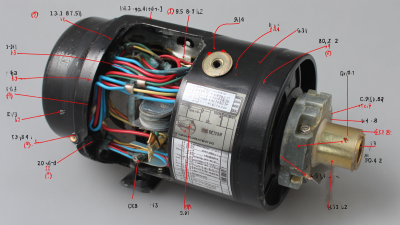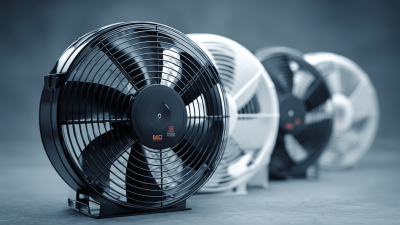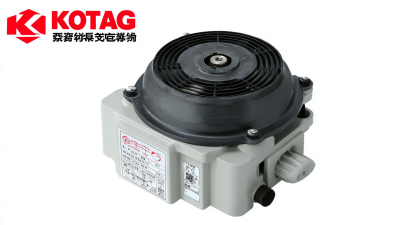




As smart home technology continues to gain traction, the role of the Heater Blower Motor is becoming increasingly pivotal in enhancing indoor climate control. According to a report by MarketsandMarkets, the global smart home market is projected to reach $174 billion by 2025, with HVAC (heating, ventilation, and air conditioning) systems playing a significant part of this growth.
These specialized motors not only contribute to energy efficiency but also enable advanced features such as programmable temperature settings and integration with IoT devices.
 With the increasing reliance on smart home ecosystems for comfort and sustainability, the evolution of Heater Blower Motors will be key to optimizing both functionality and energy consumption. As homeowners seek more intelligent solutions for climate control, understanding the innovations in Heater Blower Motors is essential for achieving a more efficient and comfortable living environment.
With the increasing reliance on smart home ecosystems for comfort and sustainability, the evolution of Heater Blower Motors will be key to optimizing both functionality and energy consumption. As homeowners seek more intelligent solutions for climate control, understanding the innovations in Heater Blower Motors is essential for achieving a more efficient and comfortable living environment.
As smart home technology continues to evolve, heater blower motors are at the forefront of transforming indoor climate control. These innovative devices are not only designed for functionality but are also engineered to optimize energy efficiency. By integrating advanced sensors and connectivity features, smart heater blower motors can adjust their operation based on real-time environmental data. This means that they can respond to factors like occupancy, outdoor weather conditions, and energy consumption patterns, significantly enhancing overall heating efficiency.
Moreover, the incorporation of smart technology allows for unprecedented control and customization of indoor climates. Homeowners can easily manage their heating settings through mobile applications, ensuring that spaces are not over or under-heated. This level of precision not only maintains comfort but also reduces energy waste, leading to lower utility bills. With features like scheduling, remote operation, and even machine learning algorithms that adapt to user preferences, smart heater blower motors offer a revolutionary approach to climate control, making sustainability a seamless part of everyday living.
The rise of smart HVAC systems marks a significant turning point in energy consumption management. According to recent analyses from the IoT Energy Management Market, the adoption of advanced technologies in smart home environments, including integrated heater blower motors, is projected to enhance energy efficiency by up to 30% by 2025. This transformation is driven by the increasing reliance on data-driven insights, which allow homeowners to optimize their heating and cooling based on real-time usage patterns and environmental conditions.
Moreover, the integration of innovative machine learning techniques aims to refine indoor climate control. Studies indicate that employing AI-driven strategies for temperature forecasting can lead to substantial energy savings, estimated at over 20% in urban smart building projects. As climate concerns mount, developing intelligent HVAC systems not only supports energy efficiency but also fosters sustainable living. The critical role of big data in climate change research emphasizes this relationship, highlighting the potential for smarter cities to fully leverage data in mitigating energy consumption and enhancing overall environmental sustainability.
The integration of IoT technologies into smart home systems is poised to significantly enhance the performance of heater blower motors. According to a recent report by the International Energy Agency (IEA), residential energy consumption can be reduced by up to 15% through optimized heating solutions powered by connected devices. By leveraging real-time data from sensors, homeowners can monitor and adjust their heating systems more efficiently, ensuring that energy use aligns with actual needs and reducing waste.
Tip: Consider investing in smart thermostats that utilize machine learning algorithms to learn your heating preferences over time. These devices can automatically adjust settings based on your habits, optimizing energy usage without sacrificing comfort.
Furthermore, the use of smart blower motors equipped with IoT capabilities allows for predictive maintenance, alerting users before mechanical failures occur. According to a study by MarketsandMarkets, the global smart home market is expected to reach $135 billion by 2025, highlighting the growing trend towards intelligent heating solutions.
Tip: Regularly update the firmware of your smart devices to benefit from the latest improvements in efficiency and security, ensuring your system continues to perform at its best.
| Attribute | Value |
|---|---|
| Energy Efficiency | Up to 30% more efficient compared to traditional models |
| IoT Integration | Real-time monitoring and control via mobile apps |
| Noise Level | Lower than 45 dB |
| Smart Features | Self-diagnostics, automated scheduling, and adaptive operation |
| Average Lifespan | 10 to 12 years with proper maintenance |
| Temperature Range | -20°C to 50°C |
| Control Mechanism | Variable speed control for optimized airflow |
| Cost of Implementation | Initial investment slightly higher, potential savings over time |
The integration of smart climate control technologies in residential settings is more than just a convenience; it is a pivotal strategy for reducing carbon footprints. According to a report by the International Energy Agency (IEA), smart home systems can lead to a 10-30% reduction in energy consumption for heating and cooling. By utilizing heater blower motors that are responsive to real-time data and occupancy patterns, homeowners can optimize their energy use and significantly lessen greenhouse gas emissions.
Furthermore, a study from Lawrence Berkeley National Laboratory suggests that smart thermostats alone can save an average of 8-15% on heating costs, which translates to over 200 million metric tons of CO2 saved annually if widespread adoption occurs. This shift not only contributes to sustainability metrics but also illustrates the financial incentives tied to energy efficiency. As technology progresses, the implementation of advanced blower motor systems will further enhance the reliability and efficiency of climate control in smart homes, serving as a crucial element in the fight against climate change.

As we look ahead to the future of smart home technology, the design and functionality of heater blower motors are set to undergo remarkable transformations. A recent trend analysis in the fan industry suggests a robust growth trajectory, buoyed by rising global temperatures and increased consumer demand for enhanced living conditions. It is estimated that the fan market will continue to expand significantly by 2025, indicating a strong potential for innovation in HVAC (heating, ventilation, and air conditioning) systems, particularly in smart home applications.

The integration of sophisticated blower motors will be paramount to meeting the evolving requirements of modern households. Advanced blower motor designs will likely feature improved energy efficiency and smart connectivity, allowing homeowners to adjust their heating and ventilation settings remotely and more intuitively. Insights from recent air purifier industry research indicate that consumer expectations are shifting towards multifunctional solutions that not only regulate temperature but also enhance air quality by filtering out pollutants. This dual focus on climate control and air purification presents a ripe opportunity for blower motor innovations in smart home technology, ensuring they contribute to a healthier and more comfortable living environment.








